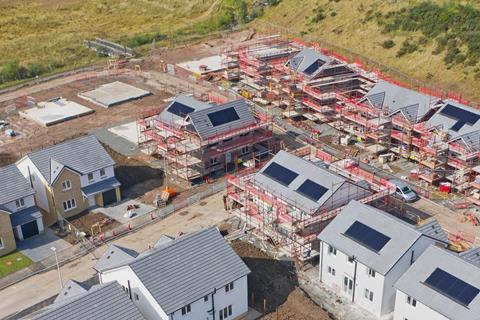But RICS residential survey reveals dent to confidence in July
New private housing output grew 1.5% in the second quarter, contributing to better-than-expected growth across the economy.
According to the latest figures from the Official for National Statistics, overall UK ecoomic output rose 0.3% between April and June, which was less than the 0.7% seen in the first quarter but above forecasts of around 0.1%.

This was driven in part by 1.2% growth in the construction sector, which came after 0.3% growth in the first quarter.
Within the sector, new work increased by 1.1% over the period, and repair and maintenance grew by 1.4%.
The 1.5% growth in new private housing ouput contributed to this, although public new housing experienced a significant contraction of -4.4%.
In repair and maintenance the largest positive contributor came from private housing, which grew by 3.3%.
Meanwhile, the latest UK residential survey from the Royal Institution of Chartered Surveyors suggested that the housing market retreated slightly in July. The RICS found that tentative signs of recovery seen in previous monthly feedback had partially reversed.
More than 1,000 chartered surveyors are asked a series of questions as part of the survey, with the “net balance” expressed in the survey corresponding to the proportion of respondents reporting a rise in a metric minus those reporting a fall. For example, if 30% reported an increase in workloads and 5% reported a fall, the net balance would be +25%.
The “net balance” refers to the proportion of respondents reporting a rise in a metric minus those reporting a fall.
New buyer enquiries reported a net balance of -6% in July, down from +4% in June, while agreed sales saw a renewed deterioration, from -4% in June to -16% last month.
Going forward, respondents expect a generally flat near-term sales outlook, with a net balance reading of just +1% being returned, compared with +7% the month before. Over a 12-month horizon, sentiment was a little more positive, with a net balance of +8%.
RICS chief economist, Simon Rubinsohn, said: “The somewhat flatter tone to the feedback to the July RICS residential survey highlights ongoing challenges facing the housing market. Although interest rates were lowered at the latest Bank of England meeting, the split vote has raised doubts about both the timing and extent of further reductions.
“Meanwhile, uncertainty about the potential contents of the chancellor’s autumn Budget is also raising some concerns. Against this backdrop, respondents continue to report that the market remains particularly price sensitive at the present time.“











No comments yet